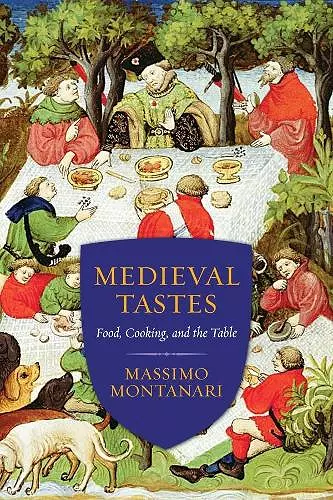Medieval Tastes
Food, Cooking, and the Table
Massimo Montanari author Beth Archer Brombert translator
Format:Hardback
Publisher:Columbia University Press
Published:17th Apr '15
Should be back in stock very soon

Acclaimed historian Massimo Montanari traces the development of medieval tastes-both culinary and cultural-from raw materials to market and captures their reflections in today's food trends. Tying the ingredients of our diet to the growth of human civilization, he details how food transformed from a simple staple to a symbol of social and ideological standing. Montanari shows how people adopted new attitudes toward food, investing as much in its pleasure and possibilities as in its acquisition.
Italy’s best-known food historian travels back to the birth of “modern” cuisine and reveals the remarkable links between medieval tastes and our own. Massimo Montanari traces the development of medieval tastes—both culinary and cultural—and details how food transformed from a simple staple to a symbol of social and ideological standing.In his new history of food, acclaimed historian Massimo Montanari traces the development of medieval tastes-both culinary and cultural-from raw materials to market and captures their reflections in today's food trends. Tying the ingredients of our diet evolution to the growth of human civilization, he immerses readers in the passionate debates and bold inventions that transformed food from a simple staple to a potent factor in health and a symbol of social and ideological standing. Montanari returns to the prestigious Salerno school of medicine, the "mother of all medical schools," to plot the theory of food that took shape in the twelfth century. He reviews the influence of the Near Eastern spice routes, which introduced new flavors and cooking techniques to European kitchens, and reads Europe's earliest cookbooks, which took cues from old Roman practices that valued artifice and mixed flavors. Dishes were largely low-fat, and meats and fish were seasoned with vinegar, citrus juices, and wine. He highlights other dishes, habits, and battles that mirror contemporary culinary identity, including the refinement of pasta, polenta, bread, and other flour-based foods; the transition to more advanced cooking tools and formal dining implements; the controversy over cooking with oil, lard, or butter; dietary regimens; and the consumption and cultural meaning of water and wine. As people became more cognizant of their physicality, individuality, and place in the cosmos, Montanari shows, they adopted a new attitude toward food, investing as much in its pleasure and possibilities as in its acquisition.
Massimo Montanari, one of the most renowned historians of cuisine, has produced a well-written volume covering a wide range of topics, from medieval recipe books to staple foodstuff. There was not one page that did not hold my complete attention. -- Massimo Ciavolella, University of California, Los Angeles Massimo Montanari is a master communicator of fascinating ideas. He proposes the intriguing concept of the Middle Ages as something at once close but also very distant. This work will prove appealing to more than just food historians, and I highly recommend it. -- David Gentilcore, University of Leicester With incisiveness and thoroughness, Massimo Montanari's Medieval Tastes redraws the contours of the central role food played in Italian society from the early centuries of the Middle Ages to the Renaissance and beyond. More than just an enthralling journey through medieval culinary tastes, regimens, and norms, this excellent volume probes the more hidden folds of the social and cultural discourses that undergirded culinary systems. -- Pina Palma, author of Savoring Power, Consuming the Times: The Metaphors of Food in Medieval and Renaissance Italian Literature Medieval Tastes is an elaborately researched, sophisticated treatment of the topic... Highly recommended. Choice A monograph that will be of enormous use to scholars working in food studies and related cultural studies fields, while also promising delight for the general interst reader as well. Sixteenth Century Journal
- Winner of Choice Outstanding Academic Title 2015
ISBN: 9780231167864
Dimensions: unknown
Weight: unknown
280 pages